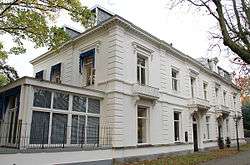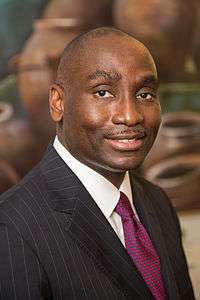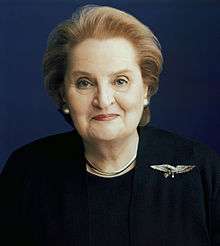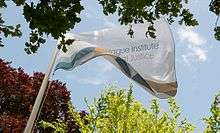The Hague Institute for Global Justice
 The Hague Institute headquarters near Plein 1813 in The Hague | |
| Abbreviation | The Hague Institute |
|---|---|
| Formation | 2011 |
| Dissolved | 2018 |
| Type | International think tank |
| Headquarters | Sophialaan 10 |
| Location | |
President |
Abiodun Williams (2013-2016) |
| Website | TheHagueInstitute.org |
The Hague Institute for Global Justice, or simply The Hague Institute, was an international think tank based in The Hague, Netherlands.[1] The Institute was established in 2011 by a consortium of partners including the Municipality of The Hague, an academic coalition of Hague-based organizations and with support from the Dutch government. Independent and non-partisan, The Hague Institute focused on interdisciplinary research in three perspectives: conflict prevention, rule of law, and global governance.
Abiodun Williams, former Senior Vice President at the U.S. Institute of Peace and former Director of Strategic Planning for UN Secretaries-General Kofi Annan and Ban Ki-moon, was the president of The Hague Institute.
Former U.S. Secretary of State Madeleine K. Albright chaired the Institute’s Advisory Council.[2]
Mission
The Hague Institute worked at the intersection of peace, security and justice and according to its website, “aims to contribute to, and further strengthen, the global framework for preventing and resolving conflict and promoting international peace.”[3]
Leadership


The Hague Institute was supported by an Advisory Council who serve as a "strategic sounding board" for the president of the Institute.[4] Dr. Abiodun Williams was appointed as the Institute's first president on January 1, 2013. Williams previously served as Senior Vice President of the Center for Conflict Management at the United States Institute of Peace (USIP) in Washington, D.C. He was preceded by Professor Willem van Genugten who served as Interim Dean of the Institute from September 2011 to December 2012. Professor Nico Schrijver, Academic Director of the Grotius Centre for International Legal Studies at Leiden University served as the Institute's first dean between January and August 2011.
Advisory Council
- Dr. Madeleine K. Albright, Chair
- Mayor Jozias van Aartsen
- Professor Igor Ivanov
- Dr. Marwan Muasher
- Dr. Shashi Tharoor
- H.E. Judge Abdulqawi A. Yusuf
Work
The work of The Hague Institute was organized around three programs - Conflict Prevention, Rule of Law, and Global Governance[5] - and covered a wide range of issues including R2P, education and conflict, climate change, water diplomacy, cyber security, mass atrocities, illicit financial flows and the role of institutions and governance such as the International Criminal Court (ICC), transitional justice.[6] According to the Institute's website, The Hague Institute provided policy-relevant research, practitioner training and convenes actors from various areas of expertise to facilitate dialogue and stimulate knowledge sharing.[7]
Projects
Commission on Global Security, Justice & Governance
The Hague Institute and the Stimson Center, based in Washington, DC gathered "a select group of eminent statespersons and public intellectuals"[8] to address global threats and challenges related to fragile states, climate change and the cyber-economy. The Commission, later renamed as the Albright-Gambari Commission, convened consultations online and around the world to facilitate a report which complements the UN Post-2015 Sustainable Development Goals agenda, the UN Peacebuilding Architecture, the Fourth Global Conference on Cyberspace in The Hague, and the UN Conference on Parties on Climate Change in Paris.
The Hague Approach
The Hague Approach was intended a flagship project of The Hague Institute. It comprises "six guiding principles for achieving sustainable peace in post-conflict situations."[9] In August 2013, the Institute presented The Hague Approach Principles during the Peace Palace centenary to King Willem-Alexander of the Netherlands and UN Secretary-General Ban Ki-moon.[10]
Global Governance Reform Initiative
The Global Governance Reform Initiative tackled issues in cyberspace, migration, and oceans. The initiative brings together stakeholders from different sectors (government, civil society, international organizations, and business) and geographical regions to address pressing issues in global governance collectively. A three-day conference titled The Future of Cyber Governance convened in May 2014 and launched the project.[11]
Water Diplomacy Consortium (WDC)
The Water Diplomacy Consortium combined expertise from five Netherlands-based organizations to serve as a “global hub” to exchange knowledge and experience in water technology and water governance.[12] The Hague Institute served as the lead partner of the WDC which also includes Netherlands Institute of International Relations Clingendael, Water Governance Centre, UNESCO-IHE Institute for Water Education, and UPEACE.
Knowledge Platform Security & Rule of Law
Consisting of a network of experts and practitioners, the Knowledge Platform focused on building “security and rule of law” in developing countries.[13] The platform was originally launched in late spring 2012 by Ben Knapen, former Dutch State Secretary for European Affairs and International Cooperation. The Hague Institute served as the primary facilitator for the platform’s partners including the Ministry of Foreign Affairs of the Netherlands.
Public Discussions

The Institute organized events and conferences to analyze a broad scope of issues related to conflict prevention, transitional justice, global security and international relations. Expert round tables aim to facilitate dialogue and knowledge sharing. The Institute has welcomed Deputy Secretary-General of the United Nations Jan Eliasson, Jurist James Crawford, United Nations High Commissioner for Human Rights Navi Pillay, Chief Prosecutor of the ICC Fatou Bensouda and United Nations Special Adviser on the Responsibility to Protect (R2P) Jennifer Welsh.[14] In April 2014, The Hague Institute partnered with the Brookings Institution to organize the first Annual Justice Stephen Breyer Lecture on International Law.[15]
In November 2013, the Institute launched the "Distinguished Speaker Series." The lecture series invites high-level international experts to discuss topics affecting global progress.[16] Speakers included Joschka Fischer, Jim Stavridis, Jan Peter Balkenende, Edi Rama and Miroslav Lajčák.
To "stimulate debate about the current course and future trajectory of Dutch foreign policy",[17] The Hague Institute gathered leading officials in Dutch government for a series of "Inside View" debates focused on the effectiveness of Dutch foreign policy. On September 10, 2013, the series launched with former Dutch political directors from the Ministry of Foreign Affairs of the Netherlands exploring the Netherlands' role in international relations, within the EU and at the United Nations.[18] The series continued with former Permanent Representatives to the United Nations on October 24, 2013 and concluded on December 11, 2013 with former Foreign Ministers of the Netherlands addressing present and future challenges of Dutch international relations.
In June 2014, the Institute, in cooperation with the US Holocaust Memorial Museum in Washington, DC and the National Security Archive at George Washington University, convened 35 officials and eyewitnesses for a multi-day conference on the Rwanda Genocide. The event was based on the 'critical oral history' approach. Participants included Ibrahim Gambari, Henry Kwami Anyidoho, Lord David Hannay, Prudence Bushnell, Michael N. Barnett and Lieutenant-General Roméo Dallaire.[19]
Publications
The Hague Institute's experts and programs produced a variety publications based on research and analysis on a scope of issues affecting global justice. These publications aimed to inform policymakers, academics, experts and the general public. In June 2014, the Institute launched a working paper series to complement its existing publication series of Policy Briefs[20] and Commentaries.[21] The working paper series aimed to "contribute original research of the highest quality to scholarly and policy debates."[22] Working papers addressed just war theory, sanctions against Iran and the relationship between constitutional law and global governance.
In August 2013, the Institute published The Hague Approach Principles, six principles for achieving sustainable peace in post-conflict situations, and a comparative study of rule of law efforts in Afghanistan and Iraq titled, Promoting the Rule of Law in Peacebuilding: Lessons from Afghanistan and Iraq. Both publications, based on empirical evidence, were presented at the centennial celebrations of the Peace Palace in The Hague.[23] The Hague Approach Principles have subsequently been endorsed by current and former UN and global leaders including San-Hyun Song, Judy Cheng-Hopkins and Jan Eliasson.
The Hague Institute produced a biannual magazine called Intersections, which highlighted activities of the Institute and featured columns from public figures working at the intersection of peace, security and global justice issues. Previous contributors to the magazine include, Madeleine Albright, Michael Kirby (judge), Fatou Bensouda and Jeanine Hennis-Plasschaert. The magazine was published biannually.
Alleged mismanagement at The Hague Institute for Global Justice
On January 1, 2013 Abiodun Williams was appointed as the Institute's first president. He was preceded by Professor Willem van Genugten who served as Interim Dean of the Institute from September 2011 to December 2012. In an article by Dutch magazine De Groene Amsterdammer (4th April 2018), sources told the magazine that Williams insisted that the position of 'international dean' had to be restyled as 'president', in addition to a very high financial compensation package in order to lend him greater authority and benefits. [24] The Dutch government granted up to 20 million Euros in subsidies for the Institute. According to staff members, Williams neglected fund raising, and spent considerable amounts of Institute funds on questionable expenses such as first class airfare, 5-star hotel rooms and long taxi rides not visibly related to the Institute's business, a claim confirmed by accounting firms. Furthermore, according to a reconstruction by Dutch newspaper de Volkskrant[25], Williams spent thousands of euros on expensive lunches at the nearby Carlton Ambassador hotel and first class flights since 'cattle class' was not good enough for him. A senior researcher quoted in the article indicates that there were many clashes between employees and Williams. According to the researcher citied, Williams distanced himself from staff whenever he felt challenged: 'Like it was beneath his dignity to talk to me directly. There was a culture clash. We academics are egalitarian. Though he was very focused on hierarchy and quickly felt criticized.'[24]
Reports claim his financial mismanagement eventually led to his departure in December 2016. In 2013, for instance, Williams claimed 10,205.50 Euro for taxi rides, including a short trip of less than a kilometer from his home to the Dutch Parliament in The Hague, which amounted to 321 Euro. On 29 October he also took a cab to Groningen costing 722.25 Euro.[26]
Shortly thereafter, another organization based in The Hague, the Center for International Legal Cooperation, considered a 'structural cooperation' out of a sense of responsibility for the loss of the subsidized funds. After viewing the financial documents, the CILC was startled by the 'deplorable situation'. Allegedly, Williams was seen behind the paper shredder for hours before his departure, which documents in question were destroyed is unclear.[27]Anton Nijssen, Williams' close associate for a long time, has been appointed by the Supervisory Board as' liquidator 'who has to take care of' the (financial) handling of cases'. There are numerous creditors, including the former landlord VNG and the Indisch Herinneringscentrum, which last year already moved into the spacious building in The Hague where the last researcher of the Hague Institute for Global Justice left just before Easter. Williams’ mismanagement is said to have been the main reason for the subsequent failure of the institute.[27]
Following the reports of the alleged mismanagement, the topic was raised in the Dutch parliament where several political parties posed questions to the Dutch Minister of Economic Affairs and Climate, Eric Wiebes. Willem Moorlag from the Dutch socialist party PvdA asked the minister whether there is any judicial ground to recover the lost funds from Williams and/or the Supervisory Board.[28] The right-wing Forum voor Democratie (FvD) asked the minister why no action was undertaken against Williams when it was already clear after several months that he didn't fulfill his role as funds raiser.[29] Jan Paternotte from the social liberal D66 asked the minister how it was possible that the Institute still received subsidies after a critical report by Price Waterhouse Coopers exposed the financial mismanagement.[30]
Closure
In April 2018, The Hague Institute for Global Justice closed down after becoming insolvent, reportedly caused by poor leadership from President Abiodun Williams, serious mismanagement, and lack of proper oversight of President Williams by the Advisory Board led by Dick Benschop.[31]
References
- ↑ "Albright crowns city with new peace institute". Archived from the original on September 28, 2011. Retrieved August 3, 2011.
- ↑ "Madeleine Albright". YouTube.com. 2011-05-31. Retrieved 2015-03-16.
- ↑ "About us". Thehagueinstituteforglobaljustice.org. Retrieved 2015-03-16.
- ↑ "Advisory Council". Thehagueinstituteforglobaljustice.org. Retrieved 2015-03-16.
- ↑ "Our Work". Thehagueinstituteforglobaljustice.org. Retrieved 2015-03-16.
- ↑ "Programs". Thehagueinstituteforglobaljustice.org. Retrieved 2015-03-16.
- ↑ "Our Work". Thehagueinstituteforglobaljustice.org. Retrieved 2015-03-16.
- ↑ "Programs". Thehagueinstituteforglobaljustice.org. Retrieved 2015-03-16.
- ↑ "The Hague Approach: What is it? | Recent News". Thehagueinstituteforglobaljustice.org. Retrieved 2015-03-16.
- ↑ "The Hague Institute Commemorates Peace Palace Centenary | News Archives". Thehagueinstituteforglobaljustice.org. Retrieved 2015-03-16.
- ↑ "The Future of Cyber Governance | Recent News". Thehagueinstituteforglobaljustice.org. 2014-05-19. Retrieved 2015-03-16.
- ↑ "Stockholm water week: New platform addresses conflicting claims over fresh water use". Dutchwatersector.com. 2013-09-06. Retrieved 2015-03-16.
- ↑ "Our Work". Archived from the original on September 27, 2013. Retrieved September 24, 2013.
- ↑ "What's Next for R2P? Dr. Jennifer Welsh on the Responsibility to Protect | Recent News". Thehagueinstituteforglobaljustice.org. 2014-10-27. Retrieved 2015-03-16.
- ↑ "The Court in the World: First Annual Justice Stephen Breyer Lecture on International Law | Recent News". Thehagueinstituteforglobaljustice.org. 2014-04-04. Retrieved 2015-03-16.
- ↑ "Programs". Thehagueinstituteforglobaljustice.org. Retrieved 2015-03-16.
- ↑ "The Effectiveness of Dutch Foreign Policy: Defense and Development | Recent News". Thehagueinstituteforglobaljustice.org. 2014-03-25. Retrieved 2015-03-16.
- ↑ "Part I: Herman Schaper: The loss of domestic consensus on foreign policy and its consequences". Thinkingpolitics.org. 2013-09-13. Retrieved 2015-03-16.
- ↑ "UN cables Reveal a Turning Point in Rwanda Crisis". The New York Times. Retrieved 2015-03-16.
- ↑ "Publications". Thehagueinstituteforglobaljustice.org. Retrieved 2015-03-16.
- ↑ "Recent Commentary". Thehagueinstituteforglobaljustice.org. doi:10.1017/S0020589314000438. Retrieved 2015-03-16.
- ↑ "Publications". Thehagueinstituteforglobaljustice.org. Retrieved 2015-03-16.
- ↑ "The Hague Institute Commemorates Peace Palace Centenary | Recent News". Thehagueinstituteforglobaljustice.org. Retrieved 2015-03-16.
- 1 2 "Hoe het Haagse Institute for Global Justice 20 miljoen subsidie verspeelde". De Groene Amsterdammer (in Dutch). Retrieved 2018-04-04.
- ↑ "de Volkskrant Krant Online". krant.volkskrant.nl. Retrieved 2018-04-04.
- ↑ Irene van der Linde and Tjitske Lingsma, "The Death of a White Elephant," International Justice Tribune, 6 April 2018, https://www.justicetribune.com/articles/death-white-elephant-hague
- 1 2 Koelé, Theo. "Geldnood nekt prestigieuze Haagse denktank, toezichthouder greep te laat in". De Volkskrant (in Dutch). Retrieved 2018-04-04.
- ↑ "De frauduleuze ondergang van het The Hague Institute for Global Justice". www.tweedekamer.nl (in Dutch). Retrieved 2018-04-09.
- ↑ Staten-Generaal, Tweede Kamer der. "Het financiële fiasco rondom het Haagse Institute for Global Justice (IGJ)". zoek.officielebekendmakingen.nl (in Dutch). Retrieved 2018-04-09.
- ↑ "D66, PvdA en FvD willen opheldering over 'geldverkwisting' Haagse denktank | NU - Het laatste nieuws het eerst op NU.nl". www.nu.nl. Retrieved 2018-04-09.
- ↑ The Hague global justice institute closes due to lack of funding; Dutchnews.nl; 4 April 2018
